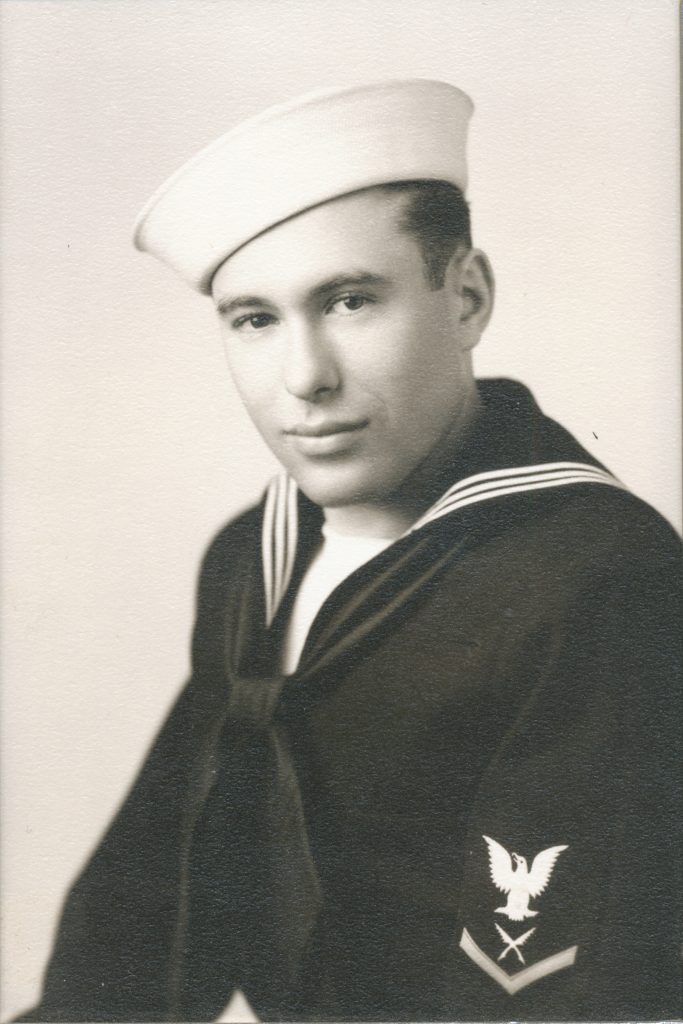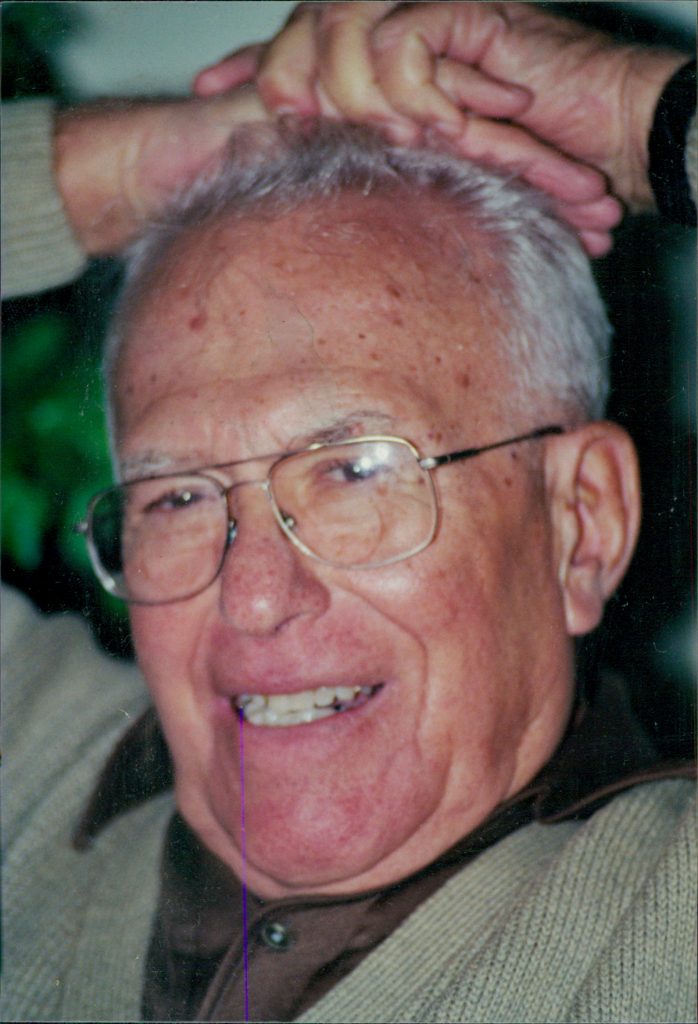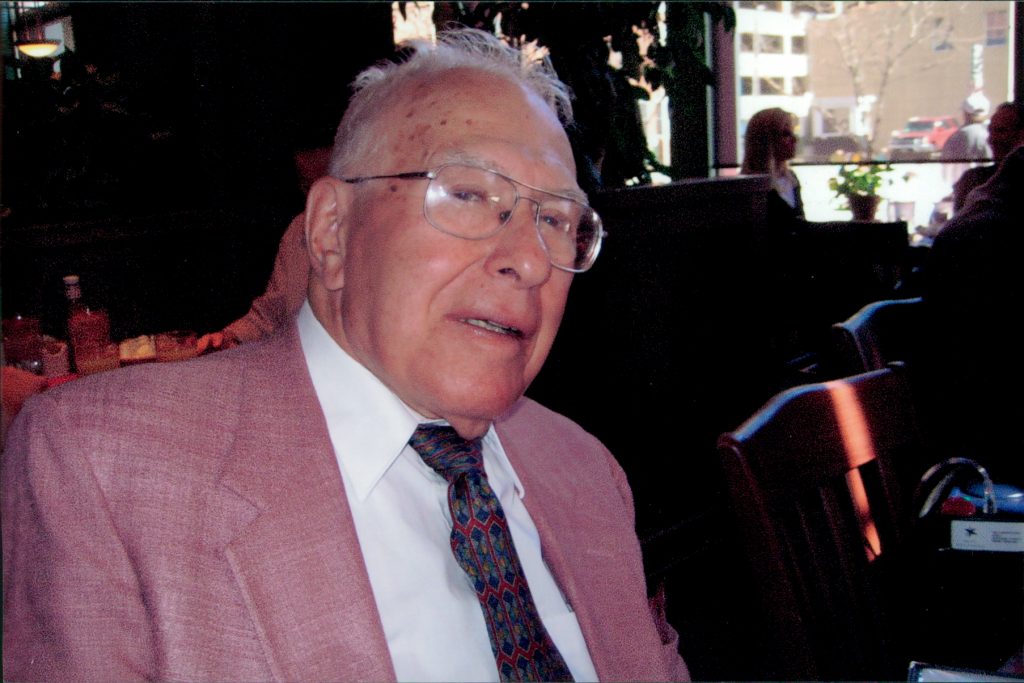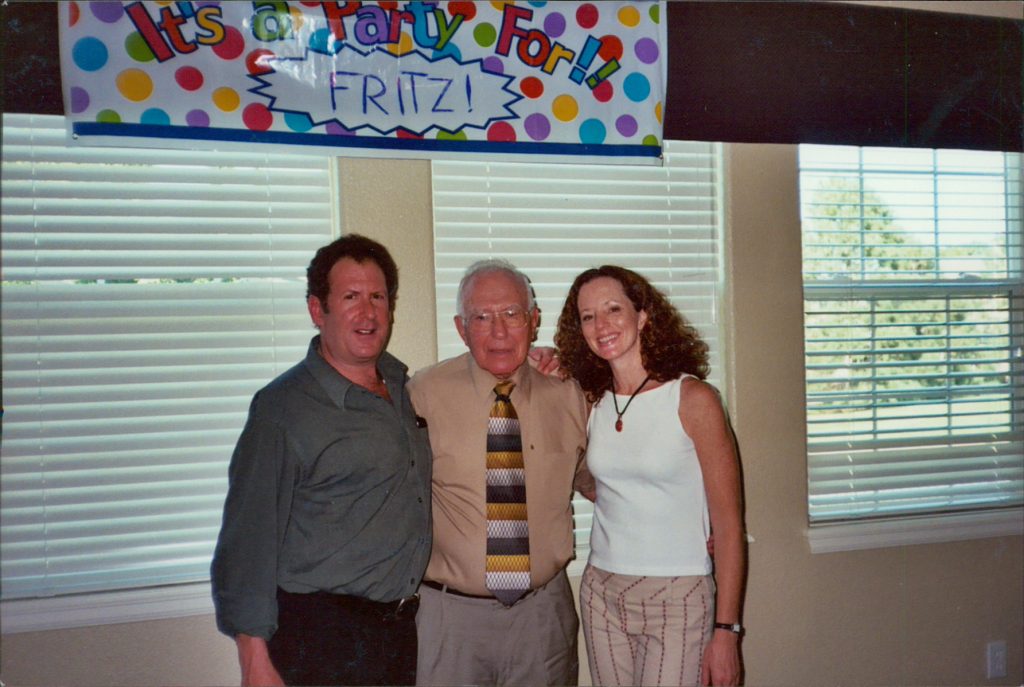If I never have a cent/I’ll be rich as Rockefeller/With gold dust at my feet/On the sunny side of the street.—Dorothy Fields and Jimmy McHugh
In late May 2021, I entered a large room to the sound of Glenn Miller’s “Moonlight Serenade” and other Big Band hits. As I took a seat, I looked around and saw more than a handful of my fellow bridge players among the dozens of people present. We were there for a memorial service for our friend Fritz (officially Irving J. “Fritz” Friedland).
It’s not unusual for a crowd to attend a memorial service, but as people reach their late 80s and 90s, many of their companions in life have left the party before them. Fritz was 101 and he didn’t have a large amount of material wealth. He had to have done something right for so many to gather to celebrate his life.

During the service, Rabbi Sara Gilbert provided a biographical sketch of Fritz. Born on New Year’s Eve 1919, he was the oldest son of Russian Jewish immigrants. His father had owned a dry cleaning business, where Fritz worked as a teen, along with other jobs. He was a World War II veteran and for many years he drove a taxi. Fritz was divorced had one child, a son named Scott, who died when Fritz was in his 90s.
While the rabbi could provide the facts about Fritz’s life, his niece Paula Friedland painted a full portrait of someone who was a proud veteran, coveted dance partner, loving father, uncle to several, and friend to all. Paula is a life coach and her remarks reflected many life lessons Fritz taught. I contacted her to help me list some of these.
You May See A Stranger. In the 1958 movie South Pacific, Giorgio Tozzi sang, “Some enchanted evening, you may meet a stranger across a crowded room … and somehow you know … that somewhere you’ll meet again and again.” In that context, the intent of the song was romantic, but Fritz seemed to anticipate that every stranger was a potential friend with an enchanting story. He always asked people about their interests and how they were doing and this wasn’t just small talk. The answers often started conversations and seldom ended them. He remembered people’s names and their stories and, with his ongoing inquiries, he kept track of their unfolding stories (including mine). Sometimes when he treated me to lunch after bridge, he’d stop to talk to people at other tables and tell me about his connection to them.
On The Sunny Side Of The Street. Fritz did a great job of making the most of his circumstances. Some people might have become chronic complainers if they had been in Fritz’s shoes, a Jew in a Christian nation, whose son died before him. And, his work as a taxi driver could have made him into a recluse, but Fritz enjoyed life and especially people as much as anyone I know.
Everybody Eats When They Come to My House. If you don’t have a family, find one. Years before he died, Fritz’s parents and son had preceded him in death and he had no grandchildren. Some would think he was alone in life, but at the memorial both Paula and her sister Jeanne referred to him as the patriarch. Some cousins and several nieces, nephews and great-nieces and great-nephews, looked up to him. He was also something of a patriarch and unifying presence among those of us who play bridge at Cook Park Recreation Center. Some might bicker with our partners over bids, but everyone enjoyed playing with Fritz, he never complained about his partners, and he loved bidding three no-trump.
With A Song In My Heart. Some sing well enough to sing a duo in public, as Paula and her long-time friend Janine did at the memorial. (Fritz knew the names of Janine’s children and always asked about them.) Others, like me, can’t carry a tune in a bucket. Fritz often burst into song, singing a classic that was appropriate to the situation at hand. All of us can hold songs in our hearts and make our own play lists for our lives.
Let’s Face The Music and Dance. Ever elegant, gracious, generous, kind and polite, Fritz was a splendid ballroom dancer and he spent evenings at all of the dance halls in Denver, sometimes moving to the actual Big Bands and leading singers of the time. These venues included the Trocadero Ballroom at Elitch Gardens, the Riviera Ballroom at Lakeside Amusement Park, and the Rainbow Ballroom. All the ladies wanted to dance with him, but he had one main partner. Even in his final days, when he couldn’t sing or walk, Paula and Janine could see him tapping his toes under the sheets.
Take Good Care Of Yourself. Fritz was physically and financially disciplined. An athlete in high school, he attributed his longevity to walking and ballroom dancing, while others pointed out that he was also a swimmer. He never drank alcohol or smoked. He had once commented to me that he thought a certain man would have looked better if he were clean-shaven. I learned at the service that Fritz, a dapper dresser, was always meticulously groomed and always wore dress shoes. He loved color and had particular fondness for pink sweater, which he wore often. So, those who had them wore pink sweaters to the service. At the memorial, Paula told about a time after a stroke when Fritz couldn’t speak the words in his mind. Finally, he blurted out the name of his insurance company. He was always responsible about money, she said.
Boogie Woogie Bugle Boy. Fritz served in the U.S. Navy during World War II and Jeanne recalled that whenever he went the VA hospital, he talked to everyone around, encouraging patients and thanking staff. He was very proud to have served.
Mares Eat Oats. The 1940s song “Mairzy Doats” includes the words “mairzy doats and dozy doats and liddle lamzy divey,” which some translate to “mares eat oats and does eat oats and little lambs eat ivy.” Either rendition of the ditty is, as the lyrics state, “nutty as a fruitcake, goofy as a goon, and silly as a loon.” I remember Fritz joking (some might say flirting) with the wait staff and me at lunch, while Paula loved the way he’d toss his head back and laugh. He laughed often, easily and with abandon, bringing joy to himself and all around.
You Are My Sunshine. Everyone has the chance to bring sunshine into others’ lives. Fritz brought sunshine into the lives of many.
I’ll Be Seeing You In All The Old, Familiar Places. The rabbi ended the service by saying that death is not an end but a transition. People live on through those who love them and, when those who were touched by Fritz die, they will see him in the afterlife. https://www.youtube.com/watch?v=uSzmuWImK7Q
As for Fritz’s bridge buddies, we laughed a lot the first time we played in person after the pandemic and we’re apt to think of him any time we bid three no-trump.
Along with her uncle Fritz, Paula Friedland, LCSW, CPCC, https://www.linkedin.com/in/paulafriedland/ inspired this post. She also gave expert advice on her uncle, his life lessons, and Big Band music, for which I’m grateful. She began her career as an actress, playing the title role in Hair with a company that toured Europe. Since about 2000, she has been a life coach and corporate trainer.
All are welcome to join bridge games at Cook Park Recreation Center, 720-865-0610. After a diaspora due to the pandemic, we resume play August 17, 2021, from nine to noon on Tuesdays and Fridays. And if you’d like my help with a writing project, I’d love to hear about it.


